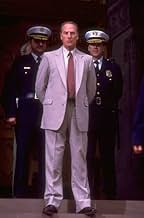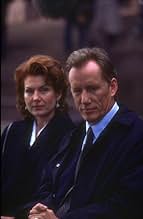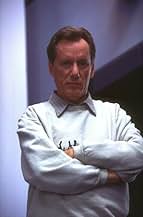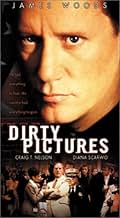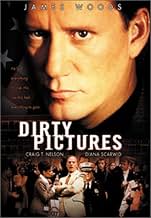Agrega una trama en tu idiomaA Cincinnati museum director goes on trial in 1990 for exhibiting sadomasochistic photographs taken by Robert Mapplethorpe.A Cincinnati museum director goes on trial in 1990 for exhibiting sadomasochistic photographs taken by Robert Mapplethorpe.A Cincinnati museum director goes on trial in 1990 for exhibiting sadomasochistic photographs taken by Robert Mapplethorpe.
- Dirección
- Guionista
- Elenco
- Nominado a 2 premios Primetime Emmy
- 4 premios ganados y 6 nominaciones en total
- Dirección
- Guionista
- Todo el elenco y el equipo
- Producción, taquilla y más en IMDbPro
Opiniones destacadas
This admirable, intelligent if occasionally formulaic TVM (it deserved to be more widely screened) makes me ask why James Woods is not acknowledged as America's best film actor? Think about it: who is a serious contender? The equally prolific but perhaps more limited de Niro? Tom Hanks (come on!)? Tom Cruise (you must be joking!)? Jack Nicholson, perhaps, in his day, which isn't now, alas? The comparable Brian Dennehey: masterly, but I think Woods has the edge. Give the man an Oscar, please! ******
Like most of the Showtime exclusive movies this one is very gutsy and makes no qualms about where it stands on the controversial issues it features.
The controversy in this case is art verses obscenity, and where or indeed if, censorship should fit in. It focuses mainly on the arrest of Dennis Barrie, the curator of Cincinnati's largest museum. He was arrested for booking a Robert Mapplethorpe exhibit despite the fact that it had already stirred up controversy elsewhere.
The film has its negative points. It tries so hard to focus on the censorship issue that it overdoses on the morality of all of those who back the anti-censorship laws. There are endless scenes of Barrie's normal, happy home life just to show he's not a fan of "degenerate art" but an upstanding citizen who just believes in defending the constitution (although his constant argument is that art is the only thing he believes in). And there is the familiar melodrama with the wife who must decide whether she should stand by her man. But James Woods and Diana Scarwid are so natural and engaging that I kind of enjoyed hanging out with them anyway! Unfortunately the rest of the cast are extremely stereotyped, especially when the film gets into the courtroom.
The other negative points have to do with the way the fans of Mapplethorpe were depicted. Either as militant "degenerates" or as eggheaded art critics who spout artbabble on cue. All of the backers of the exhibition, including Barrie, and of course all of the jury members (as we know jury members are symbolically the voice of the country as a whole), show their disgust and indignation over Mapplethorpe's work. Thus the film is left with the point being that no matter how warped and disgusting and offensive "art" may be, it has a right to be exhibited. It is a valid point but it sort of underlines the Dan Quayle theory of the "cultural elite" (ie: that contemporary art forms belong to a specific few and it's not something the "average" person can understand or appreciate). As an "average" person myself who happens to admire Robert Mapplethorpe's work, I know that is not true and I somewhat resent the fact that people like myself were not represented in this film.
This film does has many positive points though. The main ones being the intercutting of comments by such pundits as Salmon Rushdie, Barney Frank, and Fran Liebowitz. They offer great food for thought that only they could articulate so fruitfully! It also intercuts scenes from the original events which had surrounded the trial and the attempted closing down of the museum.
And despite the formula outline, there's a lot of witty and profound dialogue that packs a powerhouse of emotional grit and gives us a great deal to think about. See it with a friend (or friends/family) and you'll end up discussing it well into the night!
The controversy in this case is art verses obscenity, and where or indeed if, censorship should fit in. It focuses mainly on the arrest of Dennis Barrie, the curator of Cincinnati's largest museum. He was arrested for booking a Robert Mapplethorpe exhibit despite the fact that it had already stirred up controversy elsewhere.
The film has its negative points. It tries so hard to focus on the censorship issue that it overdoses on the morality of all of those who back the anti-censorship laws. There are endless scenes of Barrie's normal, happy home life just to show he's not a fan of "degenerate art" but an upstanding citizen who just believes in defending the constitution (although his constant argument is that art is the only thing he believes in). And there is the familiar melodrama with the wife who must decide whether she should stand by her man. But James Woods and Diana Scarwid are so natural and engaging that I kind of enjoyed hanging out with them anyway! Unfortunately the rest of the cast are extremely stereotyped, especially when the film gets into the courtroom.
The other negative points have to do with the way the fans of Mapplethorpe were depicted. Either as militant "degenerates" or as eggheaded art critics who spout artbabble on cue. All of the backers of the exhibition, including Barrie, and of course all of the jury members (as we know jury members are symbolically the voice of the country as a whole), show their disgust and indignation over Mapplethorpe's work. Thus the film is left with the point being that no matter how warped and disgusting and offensive "art" may be, it has a right to be exhibited. It is a valid point but it sort of underlines the Dan Quayle theory of the "cultural elite" (ie: that contemporary art forms belong to a specific few and it's not something the "average" person can understand or appreciate). As an "average" person myself who happens to admire Robert Mapplethorpe's work, I know that is not true and I somewhat resent the fact that people like myself were not represented in this film.
This film does has many positive points though. The main ones being the intercutting of comments by such pundits as Salmon Rushdie, Barney Frank, and Fran Liebowitz. They offer great food for thought that only they could articulate so fruitfully! It also intercuts scenes from the original events which had surrounded the trial and the attempted closing down of the museum.
And despite the formula outline, there's a lot of witty and profound dialogue that packs a powerhouse of emotional grit and gives us a great deal to think about. See it with a friend (or friends/family) and you'll end up discussing it well into the night!
As an European I can't help the temptation to comment on this movie. To be totally clear ... as a "movie", Dirty pictures isn't that good, as a documentary, it isn't either. What however is intriguing, is the subject matter ... a country that is so profound of it's first amendment, but on the other hand is so conservative makes me ask a lot of questions. Does the dogma "one's freedom ends where another individual's one start" still apply ? What is art , what is not ? And so on ... I can't answer to most of them, but it sure is interesting to think about.
More people need to see this film. It's an important one.
This film was nominated for a number of awards and won the Golden Globe for Best Miniseries or Motion Picture Made for Television.
The right to personal freedom is something that many have given their lives for over the course of history. This film really helps people understand that our freedoms are constantly under attack, continuously in jeopardy. You don't have to agree with what your neighbor may enjoy, and they you. This is the necessary understanding it takes to defend and uphold personal freedom. In allowing your fellow citizens to be free in their choices within the law, you are also defending your own freedom. This understanding, this knowledge of respecting your fellow citizens right to chose, even if you do not like their choice is the very basis of the 1st Amendment of the Untied States. Freedom of speech and beliefs, and the right to free expression itself, is essentially protected under this very idea/amendment. Nonetheless, everyday, in one way or another it's very relevance, value and existence is challenged in society.
As it is said in the film, we lose our freedom only a little at a time. If people do not fight for it continuously. The closed minded, scared and the obsessive control freak type of people, will eventually little by little take away all the freedoms that so many have given their lives for. People have fought wars to maintain the freedom we have to do what we want within our own homes, and to say and believe what we want in a public space. Not only the fearful, but also the ruthlessly greedy are constantly on the march to rob human beings of these very important aspects of life. At this point, most of us take it for granted, and if too many of us do. We will inevitably become like many other countries around the world, where your right to what you do in private is not nearly so valued, nor your right to free public expression. Instead of being looked at as a human being of unknown potential. You could be looked at as a possible threat to societal order. Many countries function not a lot differently than prisons in truth. From courageous historical figures, to modern soldiers and the children of today and tomorrow. We all owe it to them, those who value our personal right to grow as we see fit within the normal confines of the law to appreciate what we have. To stand up for your fellow neighbors right to be who they are and do what they do, as long as it's within the law of course. Law itself in the countries that value personal freedom, is truly built mostly upon an old sacred understanding. If a person is doing something that forcefully goes against another person's will, and if it effects them beyond reason, then it is illegal. Reasonable boundaries are set at what people can do to another in any circumstance. This is essentially the basis of law between human to human interactions in reasonably free countries. The importance of these things is brought to great light in this film about a true story in the American art world. If you can stand the 'dirty pictures', this is a very important film to see.
As a film, it's not perfect. It feels somewhat like a film in parts, because there are a few fairly typical clichés/scenes, and it is somewhat predictable a person could even say. Nonetheless, the story itself is so important and in my view very well told, in that it hits almost every important point about it's main topic. In this way, the film is great. I always base the vast majority of my film ratings upon the stories first and foremost. I don't need to see a perfectly lit and shot film in order for me to highly rate it. The film overall just needs to be effective in what it's setting out to say or do. Some films defy standard formulas entirely, and even reason itself, but nonetheless story for me is the main and most important ingredient in the vast majority of films. Here, we have mostly a very strong story that needs to be seen and talked about by mature adults. Chaplin is actually a great example. He was a very standard film director, almost everything was just point and shoot. But one of the things that made him special, is that he was an extremely talented and effective storyteller. The way his films look matters little, because the stories themselves are often so brilliant, relevant and/or important.
One last point, James Woods gives a great performance here.
8.5/10.
This film was nominated for a number of awards and won the Golden Globe for Best Miniseries or Motion Picture Made for Television.
The right to personal freedom is something that many have given their lives for over the course of history. This film really helps people understand that our freedoms are constantly under attack, continuously in jeopardy. You don't have to agree with what your neighbor may enjoy, and they you. This is the necessary understanding it takes to defend and uphold personal freedom. In allowing your fellow citizens to be free in their choices within the law, you are also defending your own freedom. This understanding, this knowledge of respecting your fellow citizens right to chose, even if you do not like their choice is the very basis of the 1st Amendment of the Untied States. Freedom of speech and beliefs, and the right to free expression itself, is essentially protected under this very idea/amendment. Nonetheless, everyday, in one way or another it's very relevance, value and existence is challenged in society.
As it is said in the film, we lose our freedom only a little at a time. If people do not fight for it continuously. The closed minded, scared and the obsessive control freak type of people, will eventually little by little take away all the freedoms that so many have given their lives for. People have fought wars to maintain the freedom we have to do what we want within our own homes, and to say and believe what we want in a public space. Not only the fearful, but also the ruthlessly greedy are constantly on the march to rob human beings of these very important aspects of life. At this point, most of us take it for granted, and if too many of us do. We will inevitably become like many other countries around the world, where your right to what you do in private is not nearly so valued, nor your right to free public expression. Instead of being looked at as a human being of unknown potential. You could be looked at as a possible threat to societal order. Many countries function not a lot differently than prisons in truth. From courageous historical figures, to modern soldiers and the children of today and tomorrow. We all owe it to them, those who value our personal right to grow as we see fit within the normal confines of the law to appreciate what we have. To stand up for your fellow neighbors right to be who they are and do what they do, as long as it's within the law of course. Law itself in the countries that value personal freedom, is truly built mostly upon an old sacred understanding. If a person is doing something that forcefully goes against another person's will, and if it effects them beyond reason, then it is illegal. Reasonable boundaries are set at what people can do to another in any circumstance. This is essentially the basis of law between human to human interactions in reasonably free countries. The importance of these things is brought to great light in this film about a true story in the American art world. If you can stand the 'dirty pictures', this is a very important film to see.
As a film, it's not perfect. It feels somewhat like a film in parts, because there are a few fairly typical clichés/scenes, and it is somewhat predictable a person could even say. Nonetheless, the story itself is so important and in my view very well told, in that it hits almost every important point about it's main topic. In this way, the film is great. I always base the vast majority of my film ratings upon the stories first and foremost. I don't need to see a perfectly lit and shot film in order for me to highly rate it. The film overall just needs to be effective in what it's setting out to say or do. Some films defy standard formulas entirely, and even reason itself, but nonetheless story for me is the main and most important ingredient in the vast majority of films. Here, we have mostly a very strong story that needs to be seen and talked about by mature adults. Chaplin is actually a great example. He was a very standard film director, almost everything was just point and shoot. But one of the things that made him special, is that he was an extremely talented and effective storyteller. The way his films look matters little, because the stories themselves are often so brilliant, relevant and/or important.
One last point, James Woods gives a great performance here.
8.5/10.
This is a very engaging movie that centers around an individual's right to personal taste. It does a fine job in getting the viewer thinking. It begs definitions of community standards, personal freedoms, pornography, obscenity and first ammendment protection.
I share my grandfather's take on this subject by one of his favorite sayings: '"To each, his own," said the man who kissed the cow.' There are exhibits and shows I wouldn't go to see on a bet, but I recognize there are many that would. Fortunately, we have to right to boycott or walk out if we don't like what we see.
As far as the movie itself, it's a lot like Mapplethorpe's work. He dealt with lighting, composition and mood. Granted, some of his subjects were disturbing but the total impression was masterful. This film asks and allows us to overlook the surface matter (the actual story, direction and script) and deal with the deeper aspects of the piece. I suggest you give it a view.
As always, James Woods was wonderful.
I share my grandfather's take on this subject by one of his favorite sayings: '"To each, his own," said the man who kissed the cow.' There are exhibits and shows I wouldn't go to see on a bet, but I recognize there are many that would. Fortunately, we have to right to boycott or walk out if we don't like what we see.
As far as the movie itself, it's a lot like Mapplethorpe's work. He dealt with lighting, composition and mood. Granted, some of his subjects were disturbing but the total impression was masterful. This film asks and allows us to overlook the surface matter (the actual story, direction and script) and deal with the deeper aspects of the piece. I suggest you give it a view.
As always, James Woods was wonderful.
¿Sabías que…?
- TriviaFirst Showtime production to win a Golden Globe.
- Bandas sonorasBanned in the USA
Performed by 2 Live Crew
New Lyrics by Luther Campbell, Mr. Mixx, Fresh Kid Ice and Brother Marquis
Written by Bruce Springsteen (ASCAP) Used by permission
The 2 Live Crew appears courtesy of Lil' Joe Records Inc.
Selecciones populares
Inicia sesión para calificar y agrega a la lista de videos para obtener recomendaciones personalizadas
Detalles
- Tiempo de ejecución1 hora 44 minutos
- Color
- Mezcla de sonido
- Relación de aspecto
- 1.85 : 1
Contribuir a esta página
Sugiere una edición o agrega el contenido que falta

Principales brechas de datos
By what name was Dirty Pictures (2000) officially released in Canada in English?
Responda

